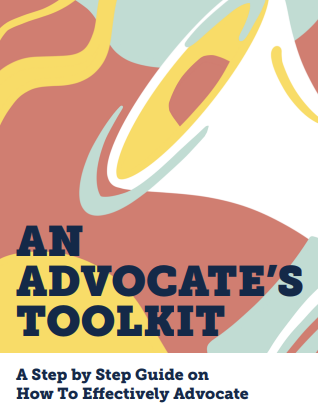Disclaimer – consider using the Hotlines and Warmlines page on the WUSA Webpage if you are experiencing immediate threats, harassment, or discrimination. To share concerns with us to help inform our work, please use the Incident Reporting Form.
Welcome to your Advocate’s Toolkit
Speaking up for yourself can be tough, but it's an important skill that helps you get what you need, set boundaries, and create positive change. Whether it's asking your professor for an extension, addressing a conflict with a roommate, or getting the right support for your well-being, knowing how to communicate your needs makes a big difference.
This guide will give you practical tips to navigate tricky conversations, express yourself clearly, and feel more confident in handling challenges—both in school and beyond.
Ready to turn your ideas into action? Use our downloadable worksheet to map out your goals, strategies, and next steps
Exploring the Full Guide
Condensed Table of Contents
- Introduction
- What is Advocacy
- How To Create a Strong Advocacy Plan
- Find the Root Cause
- Build a Clear Message
- Identify Your Audience
- Choose Your Methods
- Implement Your Plan
- Prepare for Obstacles
- Prioritize Self-Care
- Know Your Resources

Understanding Advocacy
Advocacy takes many forms, and each type plays a unique role in empowering individuals and creating positive change. Here are the three main types of advocacy you'll encounter:
How WUSA Supports Advocacy
WUSA advocates for changes that improve student life, both inside and outside the classroom. We base our work on student feedback, surveys, and discussions with students, like you, to keep our focus on what matters most.
As a large organization, we focus our advocacy on broader student issues, rather than individual cases. When it comes to smaller-scale advocacy projects, we are happy to guide you, whether you’re aiming to shape university policies, raising awareness, or making sure your concerns, like academics, mental health, or student services, are heard and accounted for.
We hope this guide will support your advocacy efforts and connect you with the right resources.
Know Your Resources
Navigating university life and advocating for change doesn’t have to be daunting. There are plenty of resources at Waterloo to help you stay informed, get support, and make your voice heard. Here are some of the best resources available for students who want to advocate for themselves and others:
Is there something you would like to include? Think we missed? We would love to hear more from you! Reach out to Amrit Khaira, Advocacy Specialist.






 The Waterloo Undergraduate Student Association (WUSA) offers resources and various ways to get involved.
The Waterloo Undergraduate Student Association (WUSA) offers resources and various ways to get involved. Got a legal issue? Whether it’s academic rights, co-op disputes, or housing problems, this program provides students with legal advice to help navigate the complexities of student life.
Got a legal issue? Whether it’s academic rights, co-op disputes, or housing problems, this program provides students with legal advice to help navigate the complexities of student life. Glow is your go-to for resources and advocacy related to sexual orientation and gender identity. They offer a supportive space for students to find community and learn more about issues affecting the 2SLGBTQ+ community.
Glow is your go-to for resources and advocacy related to sexual orientation and gender identity. They offer a supportive space for students to find community and learn more about issues affecting the 2SLGBTQ+ community. If you’re dealing with academic, social, or mental health challenges, Mates Peer Support is here to help. They provide a safe space to talk things out and connect with others.
If you’re dealing with academic, social, or mental health challenges, Mates Peer Support is here to help. They provide a safe space to talk things out and connect with others. Racial Advocacy for Inclusion, Solidarity, and Equity (RAISE) works to tackle racial equity issues and fight systemic barriers. They’re focused on creating a more inclusive campus by advocating for the voices and needs of racialized students.
Racial Advocacy for Inclusion, Solidarity, and Equity (RAISE) works to tackle racial equity issues and fight systemic barriers. They’re focused on creating a more inclusive campus by advocating for the voices and needs of racialized students. The Women’s Centre is a supportive space for students who identify as women, offering peer support, resources, and educational events through an intersectional feminist lens. They provide sexual health resources, workshops, a diverse library, and connections to campus and community support.
The Women’s Centre is a supportive space for students who identify as women, offering peer support, resources, and educational events through an intersectional feminist lens. They provide sexual health resources, workshops, a diverse library, and connections to campus and community support. If you’re having trouble navigating academic policies, need to file a petition, or want to pursue a grievance or appeal, the Centre for Academic Policy Support (CAPS) is the place to go for guidance and support.
If you’re having trouble navigating academic policies, need to file a petition, or want to pursue a grievance or appeal, the Centre for Academic Policy Support (CAPS) is the place to go for guidance and support. If you need academic accommodations for any disabilities or conditions, AccessAbility Services has got your back. They’re here to help you get the support you need to succeed at Waterloo.
If you need academic accommodations for any disabilities or conditions, AccessAbility Services has got your back. They’re here to help you get the support you need to succeed at Waterloo. The Office of Indigenous Relations at the University of Waterloo works to support Indigenous students and communities by advancing the goals of the Truth and Reconciliation Calls to Action.
The Office of Indigenous Relations at the University of Waterloo works to support Indigenous students and communities by advancing the goals of the Truth and Reconciliation Calls to Action.